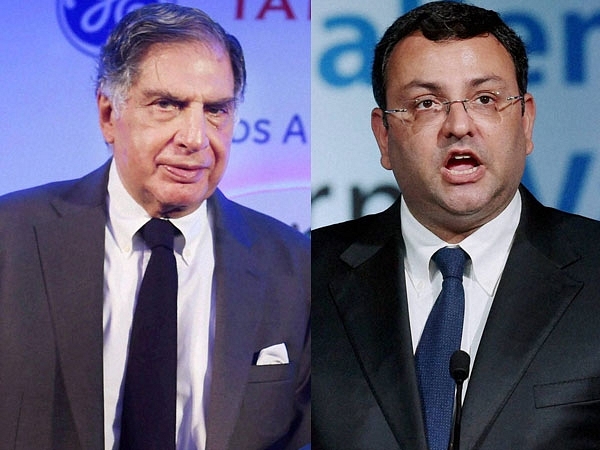Business
Tata Sons Going Private May Be A Move To Lower Cost Of Getting Mistry Out Of The Tent
- At a time when the Tatas want to end cross-holdings between group companies and allow Tata Sons to own direct stakes in key companies, the last thing they need is a noisy shareholder demanding discussion at AGMs and screaming victimisation of minority shareholders.

Ratan Tata and Cyrus Mistry.
Tata Sons has a bee in its bonnet. A few days ago, it said it wanted to convert itself back into a private limited company and not remain a public one. It has now also proposed an amendment in its articles of association so that preference shareholders can get to vote in case dividends are not paid for two years.
These moves are part of a larger plan to take Tata Sons away from larger public scrutiny. Not surprising, since it is the holding company of the conglomerate, and not an operating company. But the precipitating factor seems to be the need to get the Pallonji Mistry group out of its hair. After the ouster of Cyrus Mistry as Tata Sons chairman after a board coup last October, the Tatas want the shareholding power of his group to be partially neutralised through these moves.
With a shareholding of 18.4 per cent, various Mistry group companies can indeed create trouble for the group. Tata Sons holds 73 per cent of crown jewel Tata Consultancy Services (TCS), apart from significant stakes in various other flagship companies. An 18.4 per cent share of TCS gives the Mistry group an entitlement in the overall value of the business of at least Rs 87,986 crore. That’s more than $13 billion. This is an exit price – and it is only a part of the price – that the Tatas cannot afford to pay immediately.
At a time when the Tatas want to end cross-holdings between group companies and allow Tata Sons to own direct stakes in key companies, the last thing they need is a noisy shareholder demanding discussion at AGMs and screaming victimisation of minority shareholders.
While taking the holding company private means the board can take decisions without shareholder approvals, the move to give preference shareholders voting rights in case dividend is skipped for two years will allow large holders of these shares – including Ratan Tata, the man behind Mistry’s ouster – a larger direct stake in Tata Sons.
According to The Economic Times, Ratan Tata is the biggest holder of preference shares – about 10.5 lakh of them – though it is difficult to conceive of a situation where Tata Sons has to skip dividends, given that it is sitting on bounties from TCS. However, it is entirely conceivable that to increase group holdings and reduce debts, Tata Sons can – by design – withhold dividends and trigger these preference share conversions.
It needs no genius to figure out that these two measures – to turn Tata Sons into a private limited company and to give voting rights to preference shareholders by not paying dividends – will have a direct impact on the Mistry group’s interests. If major decisions – like reporting on related party transactions, sales of shareholdings or entire companies, or making key appointments to the board – need no shareholder approval, then Mistry’s shareholdings are worth only the dividends they earn.
Given this reality, it is unlikely that the matter will end with the next AGM on 21 September, where the proposals will be put to the vote, and where the Mistrys may not have enough shares to veto them.
Ultimately, Mistry will have to seek relief from courts, or try to stop the Tatas when the resolutions come up before the National Company Law Tribunal (NCLT) for a final clearance.
It is unlikely that the Tatas will get a carte blanche to trample upon the vital interests of a key minority shareholder, who is not without the means to fight back. But it is possible that these coercive measures are intended to put pressure on the Mistry group to make an exit on terms that are less favourable than what market valuations of the equity shares held by Tata Sons in various group companies indicate.
This could be a Tata ruse to get the Mistry camel out of the tent as soon as possible, at as low a cost as possible. Soon after Mistry’s ouster from the chairmanship, there were rumours that the Tatas may seek to buy him out by getting an outside investor. Obviously, the asking price could not have been modest.
Last week, I had speculated that it may be a good idea for Tata Sons to list so that Mistry finds it easier to exit. But the script seems to be changing.
Support Swarajya's 50 Ground Reports Project & Sponsor A Story
Every general election Swarajya does a 50 ground reports project.
Aimed only at serious readers and those who appreciate the nuances of political undercurrents, the project provides a sense of India's electoral landscape. As you know, these reports are produced after considerable investment of travel, time and effort on the ground.
This time too we've kicked off the project in style and have covered over 30 constituencies already. If you're someone who appreciates such work and have enjoyed our coverage please consider sponsoring a ground report for just Rs 2999 to Rs 19,999 - it goes a long way in helping us produce more quality reportage.
You can also back this project by becoming a subscriber for as little as Rs 999 - so do click on this links and choose a plan that suits you and back us.
Click below to contribute.
Latest